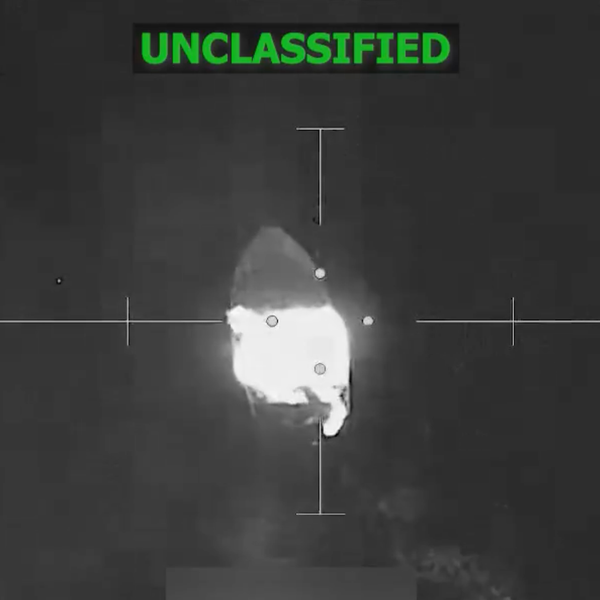
'Openly Murderous': DeSantis Outlines Border Proposal Modeled on War Zones
By admitting border agents would have to make their own "judgments" to determine whether to shoot a migrant, said one critic, the Florida governor signaled he would embrace "the large-scale murder of innocent people."
Republican presidential candidate and Florida Gov. Ron DeSantis on Monday night expanded on his proposed border policy, which he has said would include the use of "deadly force" against anyone suspected of drug trafficking—explaining to NBC News that border agents would use the same "rules of engagement" as U.S. forces in Iraq or police officers to determine when they should fire a weapon at someone.
DeSantis first proposed his border policy in June, saying he would "stop the invasion" by deputizing state and local police officers to arrest and deport migrants and detain unaccompanied children who cross the border, ending birthright citizenship, and empowering agents to use deadly force against people suspected of carrying drugs across the border—despite the fact that the vast majority of drug trafficking is carried out with commercial vehicles that travel through official ports of entry rather than people traveling on foot.
On "NBC Nightly News with Lester Holt" on Monday, correspondent Dasha Burns asked DeSantis how agents would determine who was carrying drugs across the border.
Noting that DeSantis worked as an adviser to Navy SEALs, Burns asked the governor, "How do you discern if it's a child, a mother, or a cartel member... A pregnant mom with a baseball cap and a backpack? How do you know you're using deadly force against the right people?"
DeSantis—who in a recent New York Times survey was polling at 17% among GOP voters, far behind former President Donald Trump—all but acknowledged that border agents often would not be able to tell the difference.
"It's the same you would do in any situation," he said. "Same way a police officer would know, same way somebody operating in Iraq would know. These people in Iraq at the time, they all looked the same, you didn't know who had a bomb strapped to them. So those guys have to make judgments."
According to the Costs of War project at the Watson Institute for International and Public Affairs at Brown University, some of the "judgments" made by U.S. military forces on the ground have resulted in 186,694 to 210,038 civilian deaths in Iraq since the war began in 2003.
British non-profit Iraq Body Count has reported that 13% of documented civilian deaths between 2003 and 2011 in Iraq were caused by U.S.-led coalition forces.
John Pfaff, a law professor at Fordham University, said on social media on Monday that DeSantis' proposal that border agents emulate the rules of engagement in Iraq was "terrifying" and "murderous."
The Law Enforcement Epidemiology Project at the University of Illinois Chicago reports that each year, at least 85,000 U.S. civilians suffer non-fatal injuries from the use of force by police officers, while between 600 and 1,000 people are killed by police.
Pfaff wrote that DeSantis made clear he would accept "any sort of false positive rate and the large-scale murder of innocent people" for the sake of carrying out his border policy.
Journalist David Roberts wrote that DeSantis' proposal signaled the governor's "bloodthirsty" embrace of "actual fascism."
"DeSantis," he said, "genuinely wants vulnerable 'out' groups to suffer."
An Urgent Message From Our Co-Founder
Dear Common Dreams reader, The U.S. is on a fast track to authoritarianism like nothing I've ever seen. Meanwhile, corporate news outlets are utterly capitulating to Trump, twisting their coverage to avoid drawing his ire while lining up to stuff cash in his pockets. That's why I believe that Common Dreams is doing the best and most consequential reporting that we've ever done. Our small but mighty team is a progressive reporting powerhouse, covering the news every day that the corporate media never will. Our mission has always been simple: To inform. To inspire. And to ignite change for the common good. Now here's the key piece that I want all our readers to understand: None of this would be possible without your financial support. That's not just some fundraising cliche. It's the absolute and literal truth. We don't accept corporate advertising and never will. We don't have a paywall because we don't think people should be blocked from critical news based on their ability to pay. Everything we do is funded by the donations of readers like you. Will you donate now to help power the nonprofit, independent reporting of Common Dreams? Thank you for being a vital member of our community. Together, we can keep independent journalism alive when it’s needed most. - Craig Brown, Co-founder |
Republican presidential candidate and Florida Gov. Ron DeSantis on Monday night expanded on his proposed border policy, which he has said would include the use of "deadly force" against anyone suspected of drug trafficking—explaining to NBC News that border agents would use the same "rules of engagement" as U.S. forces in Iraq or police officers to determine when they should fire a weapon at someone.
DeSantis first proposed his border policy in June, saying he would "stop the invasion" by deputizing state and local police officers to arrest and deport migrants and detain unaccompanied children who cross the border, ending birthright citizenship, and empowering agents to use deadly force against people suspected of carrying drugs across the border—despite the fact that the vast majority of drug trafficking is carried out with commercial vehicles that travel through official ports of entry rather than people traveling on foot.
On "NBC Nightly News with Lester Holt" on Monday, correspondent Dasha Burns asked DeSantis how agents would determine who was carrying drugs across the border.
Noting that DeSantis worked as an adviser to Navy SEALs, Burns asked the governor, "How do you discern if it's a child, a mother, or a cartel member... A pregnant mom with a baseball cap and a backpack? How do you know you're using deadly force against the right people?"
DeSantis—who in a recent New York Times survey was polling at 17% among GOP voters, far behind former President Donald Trump—all but acknowledged that border agents often would not be able to tell the difference.
"It's the same you would do in any situation," he said. "Same way a police officer would know, same way somebody operating in Iraq would know. These people in Iraq at the time, they all looked the same, you didn't know who had a bomb strapped to them. So those guys have to make judgments."
According to the Costs of War project at the Watson Institute for International and Public Affairs at Brown University, some of the "judgments" made by U.S. military forces on the ground have resulted in 186,694 to 210,038 civilian deaths in Iraq since the war began in 2003.
British non-profit Iraq Body Count has reported that 13% of documented civilian deaths between 2003 and 2011 in Iraq were caused by U.S.-led coalition forces.
John Pfaff, a law professor at Fordham University, said on social media on Monday that DeSantis' proposal that border agents emulate the rules of engagement in Iraq was "terrifying" and "murderous."
The Law Enforcement Epidemiology Project at the University of Illinois Chicago reports that each year, at least 85,000 U.S. civilians suffer non-fatal injuries from the use of force by police officers, while between 600 and 1,000 people are killed by police.
Pfaff wrote that DeSantis made clear he would accept "any sort of false positive rate and the large-scale murder of innocent people" for the sake of carrying out his border policy.
Journalist David Roberts wrote that DeSantis' proposal signaled the governor's "bloodthirsty" embrace of "actual fascism."
"DeSantis," he said, "genuinely wants vulnerable 'out' groups to suffer."
Republican presidential candidate and Florida Gov. Ron DeSantis on Monday night expanded on his proposed border policy, which he has said would include the use of "deadly force" against anyone suspected of drug trafficking—explaining to NBC News that border agents would use the same "rules of engagement" as U.S. forces in Iraq or police officers to determine when they should fire a weapon at someone.
DeSantis first proposed his border policy in June, saying he would "stop the invasion" by deputizing state and local police officers to arrest and deport migrants and detain unaccompanied children who cross the border, ending birthright citizenship, and empowering agents to use deadly force against people suspected of carrying drugs across the border—despite the fact that the vast majority of drug trafficking is carried out with commercial vehicles that travel through official ports of entry rather than people traveling on foot.
On "NBC Nightly News with Lester Holt" on Monday, correspondent Dasha Burns asked DeSantis how agents would determine who was carrying drugs across the border.
Noting that DeSantis worked as an adviser to Navy SEALs, Burns asked the governor, "How do you discern if it's a child, a mother, or a cartel member... A pregnant mom with a baseball cap and a backpack? How do you know you're using deadly force against the right people?"
DeSantis—who in a recent New York Times survey was polling at 17% among GOP voters, far behind former President Donald Trump—all but acknowledged that border agents often would not be able to tell the difference.
"It's the same you would do in any situation," he said. "Same way a police officer would know, same way somebody operating in Iraq would know. These people in Iraq at the time, they all looked the same, you didn't know who had a bomb strapped to them. So those guys have to make judgments."
According to the Costs of War project at the Watson Institute for International and Public Affairs at Brown University, some of the "judgments" made by U.S. military forces on the ground have resulted in 186,694 to 210,038 civilian deaths in Iraq since the war began in 2003.
British non-profit Iraq Body Count has reported that 13% of documented civilian deaths between 2003 and 2011 in Iraq were caused by U.S.-led coalition forces.
John Pfaff, a law professor at Fordham University, said on social media on Monday that DeSantis' proposal that border agents emulate the rules of engagement in Iraq was "terrifying" and "murderous."
The Law Enforcement Epidemiology Project at the University of Illinois Chicago reports that each year, at least 85,000 U.S. civilians suffer non-fatal injuries from the use of force by police officers, while between 600 and 1,000 people are killed by police.
Pfaff wrote that DeSantis made clear he would accept "any sort of false positive rate and the large-scale murder of innocent people" for the sake of carrying out his border policy.
Journalist David Roberts wrote that DeSantis' proposal signaled the governor's "bloodthirsty" embrace of "actual fascism."
"DeSantis," he said, "genuinely wants vulnerable 'out' groups to suffer."

